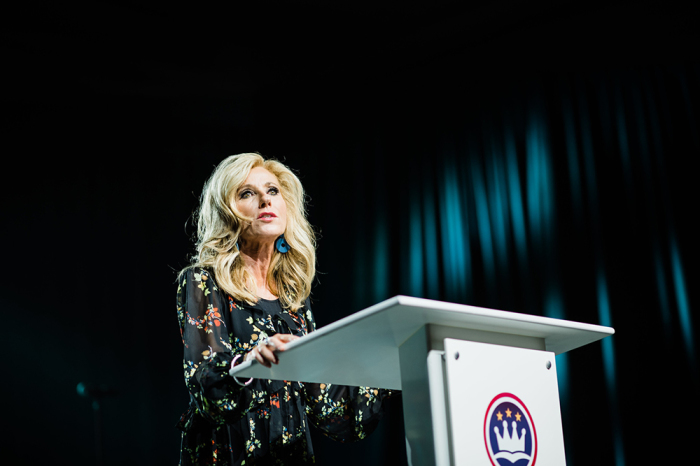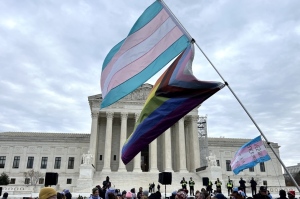Beth Moore answers: Does complementarian theology cause abuse within the Church?

Bible teacher Beth Moore has said that while complementarian theology does not necessarily cause abuse in the Church, having too few women in power has directly contributed to the sexual abuse crisis in the Southern Baptist Convention.
On Thursday, the founder of Living Proof Ministries delivered a message titled “The Courage to Confront the Crisis of Abuse in the Church” at the Caring Well conference hosted by the Ethics & Religious Liberty Commission of the Southern Baptist Convention.
She began by asking the question of whether “complementarian” theology – the idea that women have distinct roles in the family and church and are forbidden from holding certain offices in the church – is to blame for the abuse crisis within the SBC.
“The answer’s 'no,'” she said. “Sin and gross selfishness in the human heart cause abuse. Demonic influences cause abuse.”
"However,” she continued, “has a culture prevalent in various circles of the SBC formed and burgeoned out of it contributed to it? Absolutely, and heavily.”
Moore argued that the world is watching to see if Southern Baptists will deal with “what they believe is the biggest elephant in the room.”
Complementarian theology, Moore explained, became “such a high, core value, that it inadvertently ... became elevated above the safety and well-being of many women.
“So high a core value has it become that in much of our world complementarian theology is now conflated with inerrancy,” she stressed. “Case in point: notice how often our world charges or dismisses egalitarians by saying they have a low view of Scripture because unless they think like us about complementarian theology they do not honor the word of God.”
“Watch for it,” she added. “Test it and see if it is so.”
Moore lamented that “so few women” are in any visible areas of leadership in both SBC congregations and SBC seminaries.
“Women who are being abused by the system itself, or within it by people that are in places of power, don’t even have a female to turn to,” she contended. “They don’t even know where to go.”
If complementarianism were a woman, the speaker and author said, “I’d tell you that woman is being abused and somebody needs to call the police and start an investigation.”
“God help us if the police are in on it,” she said.
Moore clarified that she’s “not suggesting we throw out the woman,” continuing with the metaphor. “I don’t see any signs of that happening.”
“I’m saying it is imperative, if the SBC is to become a healthier church culture, that she [the church] be protected from abuse and from exploitation for the sake of owning all the power,” she explained. “We must be willing to courageously face all that makes us vulnerable.”
“Misogyny has no place in those who are being conformed to the image of the Lord Jesus Christ,” she declared.
The speaker and author also described the mishandling of abuse allegations in the SBC as “a very public stumbling block to the gospel.”
“This denomination is embroiled in a scandal where the name of God – of the Holy One who dwells in unapproachable light – has been used as a storefront for darkness,” Moore said. “What has happened among us broadcasts a message to the unsaved that we are unsafe.”
"It will take no small amount of courage to confront the crisis of abuse amidst rampant skepticism," she declared. "The skepticism is fair, because talk is cheap. We earned distrust, and now we must take the long road of earning trust and walk forward in a posture of humility. It will take much courage not only to resist defensiveness but to resist deflection.
"If we are cowards, the generation coming up behind us will either despise us or be like us."
Earlier in the evening, Moore participated in a panel titled "Sexual Abuse in the Southern Baptist Convention" alongside J.D. Greear, Amy Whitfield, and Ronnie Floyd.
Moderator Phillip Bethancourt pointed out that when the Houston Chronicle published the first article in its six-part investigative series on abuse within SBC churches back in February, many church leaders were shocked. Women, however, were less surprised by the revelation.
“Why is there sometimes a disconnect between some of the ways people react to this, and how should we think about these revelations?” Bethancourt asked.
“A lot of us who have been through this kind of pain or have known people one-on-one, counseled people, ministered to people, who have been through it, we probably talk more openly about it and are very aware of how often it happens,” Moore responded. “Just numbers that will sit around a table — you realize how many of you around that table have that kind of background and for some reason have been subject to some form of abuse, whether it’s spiritual abuse or sexual abuse.”
Moore expressed hope that now that so many cases of sexual abuse have been brought to light, true change will happen. She encouraged churches to undergo a 12-month training on how to handle the issue of sexual abuse within the church.
While sexual abuse is an “enormous” issue many churches are unfortunately just now addressing, it will continue to be a problem “until Jesus comes back,” she warned.
“This will just go back exactly the way that it began,” Moore stressed. “This will be something that will not curb; we won’t fix it and we’ll be done and go on with it. This is an illness in the human heart and demonic powers and forces, so we’ve got to be in for the long haul. As surely as we would bring up any other topic in our sermons and lessons and the things we address in our churches, we [need to] bring this up.”
Poet and hip-hop artist Jackie Hill Perry also shared how she was sexually abused as a child. When she grew up and got married, Perry said she had difficulty accepting her husband’s complementarian view based on her past experiences.
“He wanted to lead me well, but complementarianism as it looks when lived was terrifying when I remembered the last time I let a boy lead me,” she said.





























